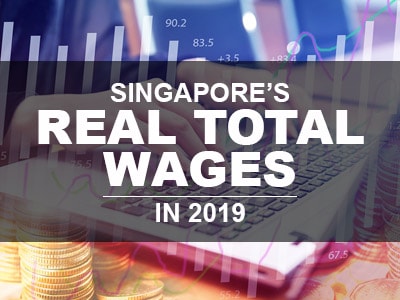Singapore’s Real Total Wages in 2019 Might Not Be as Optimistic as Last Year
 While Singapore’s employment scene faced strong growth in 2018, upping the real wages to 4.2% last year, Real total wages in 2019’s prospects might not be as promising.
While Singapore’s employment scene faced strong growth in 2018, upping the real wages to 4.2% last year, Real total wages in 2019’s prospects might not be as promising.
Economists are predicting a less than optimistic outcome for Singapore’s labour market in 2019, even though last year saw more employees receiving an increase in their wages while the markets continued to retain its strong growth. However, increased trade tensions this year, coupled with slower growth prospects, leaves a less than optimistic outlook for the markets this year.
In 2018, Singapore’s real total wages rose again after slowing down for the two consecutive years prior to that. The growth experienced accounted for an inflation rate 0.4%. The 4.2% growth last year was an increase from the 3.2% total in 2017, per the report released by Singapore’s Ministry of Manpower (MOM). The report in question was the Report on Wage Practices. The growth includes much higher bonus rates, which was 2.06 months of an employee’s basic wage in 2018.
MOM’s report included surveys done from December 2018 to March 2019, covering 5,300 companies in the private sector that employed a minimum of 10 employees. Combined, the firms in the survey had a total of 1.2 million staff. This number includes 584,100 full-time workers (locals) who had at least a year of service with the company, and 187,900 part-time staff who had less than one year of service. Other employees involved in the survey were foreign workers.
The positive increase in Singapore salaries was largely thanks to the strong growth in employment the country experienced. This, even though the economy experienced a slowdown, achieving only a 3.1% growth in 2018 as opposed to the 3.7% growth it experienced in 2017. Economists believe that the wage growth was not factored into the economy’s slowdown in the second half of last year.
As per the usual, Singapore based companies started the year off on a positive note. Companies continued to make plans the way they always did, making allocations for the manpower needed and the upcoming bonus payouts. Thanks to improvements experienced in profitability, the proportion of raised wages in 2018 rose to 67% from 2017’s total of 65%. On top of that, the proportion of companies who downsized employee wages was only 9% in 2018, compared to the 12% recorded in 2017.
The industries in Singapore that recorded the highest growth in nominal wages in 2018 came from the insurance services, professional services and financial services sectors. Industries that posted similar to moderate growth in wages were the beverage, manufacturing and retail trade industries.
In total, employees who received a bump in their pay in 2018 increased to 81% from the 78% total in 2017. On average in 2018, the rise experienced was 5.8%, which was once again an increase from 2017’s figure of 5.1%. Employees with lower wages were not left out of the loop either, with 6 out of 10 Singapore companies bumping up the salaries of their low-wage employees in 2018. However, employees who received a downgrade in their salaries experienced cuts of 4.3% in 2018, compared to the 3.9% recorded in 2017.
Unfortunately, the outlook is not as optimistic for 2019, despite the strong numbers experienced last year. Aside from the expected lower nominal wage growth, more businesses were expected to downsize employee wages too. As Singapore continues to plough forward with its Smart Nation initiatives, employees working in jobs related to digitalisation should still do relatively well.
The National Wages Council will be releasing its annual wage guidelines soon.
3E Accounting recommended that employers may wish to be cautioned when conducting annual adjustments for its human capital as the current GDP is minus zero.
Employers are encouraged to develop and train its internal human capital for deepening of skill sets that will boost productivity.; NWC affirms that wage growth must be supported by productivity growth based on business transformation and re-skilling of the workforce to reflect on the wage increase. Implementing structured learning/training programmes for employees during the slow economy and taking advantage with skilled resources when the economy thrives again.
As responsible and inclusive employers, engagement of the seniors voluntarily and providing PMETs job opportunities within the organizations are patriotic moves. Our Singapore government has been supportive and generous to assist SMEs through the PCP (Professional Conversion Programme), CSP (Career Support Programme) and Career Trial disbursing subsidies and grants to employers toeing the direction of the government for mutual sustainability and benefits in the long run. Employers may receive up to $42,000 per year of salary support for each PMETs hired, reducing fixed costs for the employers who hire skilled and experienced PMETs. Furthermore, an additional of $5,000 assistance grant to SMEs to recruit and manage newly – hired PMETs.
3E Accounting Singapore supports our community that we operate in and we are glad should we can assist you in any way. We can be contacted through our email : info@3ecpa.com.sg







